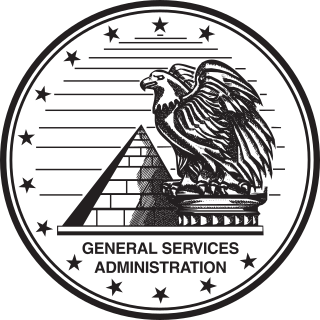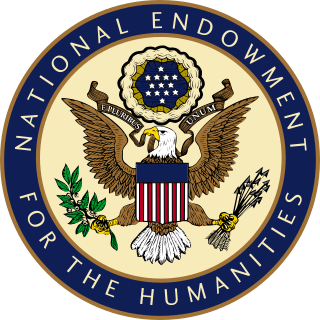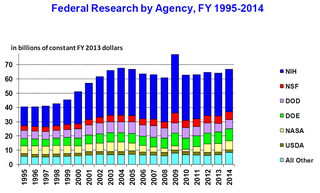Related Research Articles

The National Archives and Records Administration (NARA) is an independent agency of the United States government within the executive branch, charged with the preservation and documentation of government and historical records. It is also tasked with increasing public access to those documents that make up the National Archives. NARA is officially responsible for maintaining and publishing the legally authentic and authoritative copies of acts of Congress, presidential directives, and federal regulations. NARA also transmits votes of the Electoral College to Congress. It also examines Electoral College and constitutional amendment ratification documents for prima facie legal sufficiency and an authenticating signature.
E-government is the use of technological communications devices, such as computers and the Internet, to provide public services to citizens and other persons in a country or region. E-government offers new opportunities for more direct and convenient citizen access to government and for government provision of services directly to citizens.

The Library of Congress National Digital Library Program (NDLP) is assembling a digital library of reproductions of primary source materials to support the study of the history and culture of the United States. The NDLP brought online 24 million books and documents from the Library of Congress and other research institutions.

The National Technical Information Service (NTIS) is an agency within the U.S. Department of Commerce. The primary mission of NTIS is to collect and organize scientific, technical, engineering, and business information generated by U.S. government-sponsored research and development, for private industry, government, academia, and the public. The systems, equipment, financial structure, and specialized staff skills that NTIS maintains to undertake its primary mission allow it to provide assistance to other agencies requiring such specialized resources.
The United States Government Publishing Office is an agency of the legislative branch of the United States Federal government. The office produces and distributes information products and services for all three branches of the Federal Government, including U.S. passports for the Department of State as well as the official publications of the Supreme Court, the Congress, the Executive Office of the President, executive departments, and independent agencies.
The National Climate Assessment (NCA) is an initiative within the U.S. federal government focused on climate change science, formed under the under the auspices of the Global Change Research Act of 1990.

The General Services Administration (GSA) is an independent agency of the United States government established in 1949 to help manage and support the basic functioning of federal agencies. GSA supplies products and communications for U.S. government offices, provides transportation and office space to federal employees, and develops government-wide cost-minimizing policies and other management tasks.

The Federal Register is the official journal of the federal government of the United States that contains government agency rules, proposed rules, and public notices. It is published every weekday, except on federal holidays. The final rules promulgated by a federal agency and published in the Federal Register are ultimately reorganized by topic or subject matter and codified in the Code of Federal Regulations (CFR), which is updated quarterly.

The National Endowment for the Humanities (NEH) is an independent federal agency of the U.S. government, established by the National Foundation on the Arts and the Humanities Act of 1965, dedicated to supporting research, education, preservation, and public programs in the humanities. The NEH is housed at 400 7th St SW, Washington, D.C. From 1979 to 2014, NEH was at 1100 Pennsylvania Avenue, N.W., Washington, D.C., in the Nancy Hanks Center at the Old Post Office.

The Federal Depository Library Program (FDLP) is a government program created to make U.S. federal government publications available to the public at no cost. As of April 2021, there are 1,114 depository libraries in the United States and its territories. A "government publication" is defined in the U.S. Code as "informational matter which is published as an individual document at Government expense, or as required by law".

A law library is a special library used by law students, lawyers, judges and their law clerks, historians and other scholars of legal history in order to research the law. Law libraries are also used by people who draft or advocate for new laws, e.g. legislators and others who work in state government, local government, and legislative counsel offices or the U.S. Office of Law Revision Counsel and lobbying professionals. Self-represented, or pro se, litigants also use law libraries.

The Law Library of Congress is the law library of the United States Congress. The Law Library of Congress holds the single most comprehensive and authoritative collection of domestic, foreign, and international legal materials in the world. Established in 1832, its collections are currently housed in the James Madison Memorial Building of the Library of Congress. Law staff rely on and utilize 2.9 million volumes of primary legal sources, 102.18 million microforms, 99,000 reels of microfilm, 3.18 million pieces of microfiche, and 15,600 tangible electronic resources, making it is the largest law library in the world.
USA.gov is the official web portal of the United States federal government. It is designed to improve the public's interaction with the United States government by quickly directing website visitors to the services or information they are seeking, and by inviting the public to share ideas to improve government. USA.gov links to every federal agency and to state, local, and tribal governments, and is the most comprehensive site in—and about—the United States government. While the primary target audience of USA.gov is the American public, about 25 percent of USA.gov's visitors come from outside the United States.

A special library is a library that provides specialized information resources on a particular subject, serves a specialized and limited clientele, and delivers specialized services to that clientele. Special libraries include corporate libraries, government libraries, law libraries, medical libraries, museum libraries, news libraries. Special libraries also exist within academic institutions. These libraries are included as special libraries because they are often funded separately from the rest of the university and they serve a targeted group of users.
The NII Awards was an awards program designed to recognize excellence and innovation in use of the Internet. The National Information Infrastructure Awards, later known as the Global Information Infrastructure (GII) Awards were given from 1995 though 1999.

The science policy of the United States is the responsibility of many organizations throughout the federal government. Much of the large-scale policy is made through the legislative budget process of enacting the yearly federal budget, although there are other legislative issues that directly involve science, such as energy policy, climate change, and stem cell research. Further decisions are made by the various federal agencies which spend the funds allocated by Congress, either on in-house research or by granting funds to outside organizations and researchers.

The Special Inspector General for Afghanistan Reconstruction (SIGAR) is the U.S. government's leading oversight authority on Afghanistan reconstruction. Congress created the Office of the Special Inspector General for Afghanistan Reconstruction to provide independent and objective oversight of the Afghanistan Reconstruction funds. Under the authority of Section 1229 of the National Defense Authorization Act for Fiscal Year 2008, SIGAR conducts audit, inspections, and investigations to promote efficiency and effectiveness of reconstruction programs, and to detect and prevent waste, fraud, and abuse of taxpayer dollars. SIGAR also has a hotline that allows individuals to report suspected fraud.
National edeposit (NED) is a collaboration between Australia's nine national, state and territory libraries which provides for the legal deposit, management, storage and preservation of, and access to, published electronic material across Australia. It is a website, a system and a service, the result of a project by National and State Libraries Australia, and is a world-first collaboration. The National Library of Australia (NLA), Libraries ACT, Libraries Tasmania, Northern Territory Library, State Library of New South Wales, State Library of Queensland, State Library of South Australia, State Library Victoria and the State Library of Western Australia are the member organisations, while the system is hosted and managed by the NLA.
References
- ↑ Dec 2014 glin.gov archive
- ↑ "Global Legal Information Network Garners Excellence in Government Award". Library of Congress, Washington, D.C. 20540 USA. Retrieved 6 September 2022.